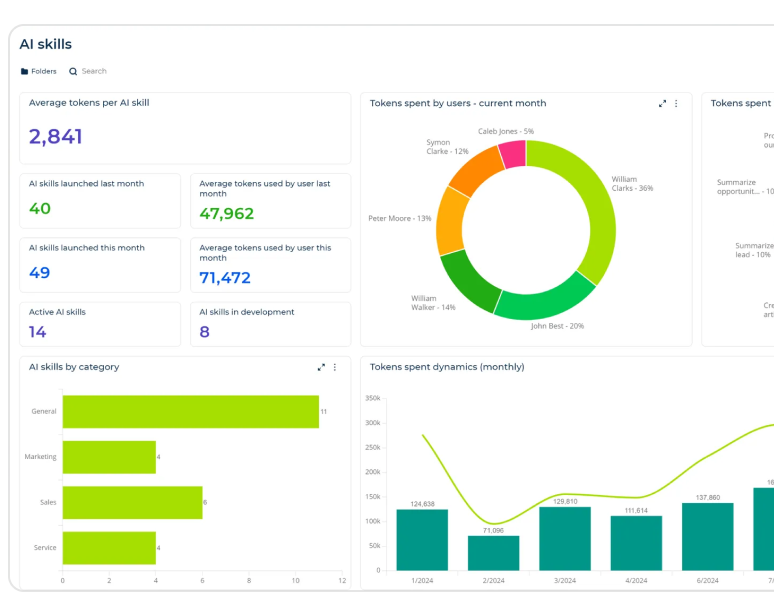-
No-Code
Platform
-
Studio
No-code agentic platform delivering the fastest time-to-value and the highest ROI
-
Studio
-
AI-Native CRM
CRM
-
AI-Native CRM
New era CRM to manage customer & operational workflows
CRM Products -
AI-Native CRM
- Industries
- Customers
- Partners
- About
A Comprehensive Guide to AI in Marketing: Benefits, Use Cases & Best Tools to Consider
Updated on
October 14, 2025
18 min read
Optimize Marketing Campaigns in Real-Time With AI

Artificial intelligence is reshaping nearly every industry today, and marketing is among those feeling its impact the most. What once required weeks of analysis or creative testing can now happen in real time, powered by intelligent systems that learn and adapt.
According to Influencer Marketing Hub, almost 69% of marketers already use AI to support daily operations—and this number continues to grow each year.
Every day, new AI marketing tools emerge, helping teams work faster, make smarter decisions, and personalize campaigns at scale. Yet many businesses still face a key question: where can AI bring the most value to marketing?
In this guide, we’ll explore what is AI in marketing, the benefits it delivers, and how your team can use these technologies to build impactful, data-driven campaigns.
Key Takeaways:
- AI in marketing helps teams work faster, make smarter decisions, and achieve higher efficiency across every stage of the marketing process.
- AI marketing tools can support a wide range of activities, including campaign management, content generation, customer journey personalization, digital advertising, email automation, competitor analysis, and brand reputation management.
- To successfully implement AI in marketing, businesses can either adopt specialized AI tools for specific functions or opt for enterprise-grade AI marketing platforms that integrate multiple marketing applications within a single ecosystem.
- Leading AI marketing platforms and tools include Creatio Marketing, Jasper AI, Surfer SEO, and other innovative solutions that are transforming how modern marketing teams operate.
The State of AI Agents & No-Code
Learn how 560+ leaders across the world use AI and no-code to drive innovation today
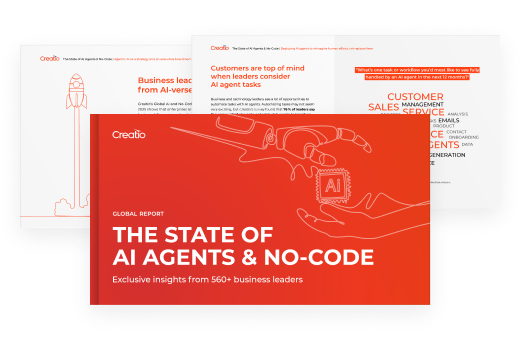
What is AI Marketing?
AI marketing (AI in Marketing) refers to the use of artificial intelligence (AI) technologies — such as machine learning, natural language processing, generative AI, and role-specific AI Agents — to automate marketing workflows, personalize user experiences, and enhance campaigns for greater engagement and higher conversion rates.
The goal of AI marketing is to make marketing processes more data-driven, efficient, and personalized, allowing humans to focus on strategic and creative tasks. In practice, AI in marketing enables teams to:
- Generate tailored content for emails, ads, and landing pages that resonate with different audiences.
- Segment audiences based on behavior, demographics, or stage in funnel for more precise targeting.
- Analyze user interactions to forecast conversion likelihood, and recommend next-best actions for better nurturing.
- Automate ad targeting and budget allocation across channels to maximize ROI.
- Monitor and optimize campaign performance in real time with data-driven recommendations.
Overall, AI marketing uses advanced analytics and automation to perform repetitive tasks that would either take a lot of time for marketers or be completely impossible, such as analyzing large data sets to find patterns.
Key Benefits of AI in Marketing
For many digital marketers and business leaders, AI has become an essential part of daily marketing workflows, helping teams make smarter decisions, deliver more relevant customer experiences, and optimize campaigns performance across every channel.
Below are the most important benefits that AI in marketing can bring to your business today.
Smarter, Data-Driven Decisions
AI enables marketers to process and interpret massive volumes of structured and unstructured data that would be impossible to analyze manually.
Using AI marketing tools, teams can uncover patterns in customer behavior, campaign performance, and market trend changes, transforming raw data into actionable insights. This empowers marketing leaders to make evidence-based decisions, refine strategies in real time, and consistently improve efficiency and results.
Enhanced Personalization at Scale
Personalization has become a core expectation among customers, yet many brands still struggle to deliver it effectively. According to Gartner, 48% of personalized communications miss the mark, often seen as irrelevant or intrusive.
AI marketing tools make large-scale personalization not only possible but highly effective. By combining data from multiple touchpoints — including website activity, emails, ads, and social media — AI can tailor marketing messages and offers to match each customer’s interests and stage in the buying journey.
The result is hyper-personalized engagement that builds trust and increases conversion probability.
Increased Marketing Efficiency and Productivity
AI marketing automates a wide range of repetitive and time-consuming tasks, including lead scoring, content generation, campaign planning, and performance optimization.
By reducing manual workload and minimizing human error, it allows marketing professionals to focus on strategy, creativity, and innovation—the activities that truly drive value.
Automation also shortens campaign cycles, enabling organizations to launch, test, and refine marketing campaigns faster and respond quickly to new opportunities or changing market conditions.
Higher ROI for Your Campaigns
AI marketing systems constantly analyze performance data to identify what works best across channels and audiences. In particular, AI can predict conversion likelihood, optimize ad placements, and automatically allocate budget toward the highest-performing campaigns.
These predictive and optimization capabilities help businesses better manage marketing budget, improve cost efficiency, and maximize the return on every dollar invested.
Improved Customer Insights
AI marketing tools integrate data from multiple platforms — such as CRMs, ad systems, analytics tools, and customer support databases — to create a unified customer view and apply this knowledge across every interaction.
These AI insights allow teams to better understand motivations, preferences, and behaviors, fueling accurate segmentation and targeted messaging. For example, content teams can craft messages that reflect real customer needs, while PPC specialists use AI insights to fine-tune ad targeting and bidding strategies.
Over time, it helps businesses enhance marketing tactics, strengthen brand relationships, and stand out in competitive markets.
Greater Transparency and Real-Time Analytics
AI-powered analytics give marketing leaders real-time visibility into every aspect of marketing performance — across CRM systems, digital ad platforms, social media, and email campaigns.
This transparency helps businesses consistently track KPIs, identify underperforming tactics, and understand why specific approaches succeed or fail. For instance, AI marketing agents can monitor live data, detect anomalies, and alert managers to refine specific assets to improve campaign outcomes.
As a result, marketers gain full awareness of campaign performance and strategy effectiveness, can make faster, data-driven decisions, and foster greater accountability across departments.
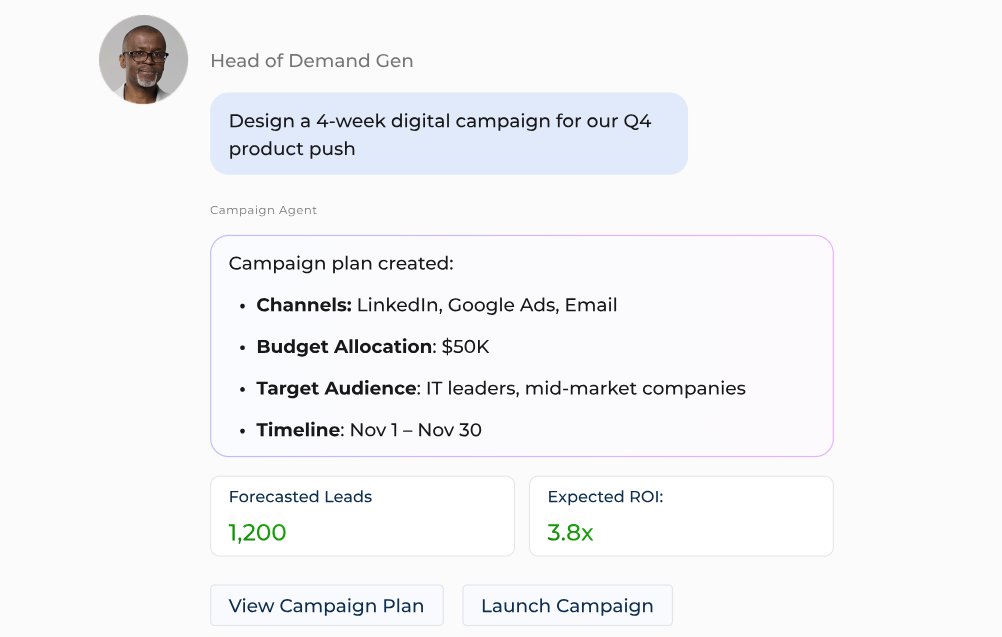
Example of AI applications in marketing with Creatio Marketing
10 Most Popular Use Cases of AI in Marketing
Let's review the primary use cases for AI marketing and explore how the technologies listed in the section above actually benefit marketers.
#1. Campaign Management & Optimization
AI marketing systems enable marketers to plan, execute, and refine campaigns with far greater accuracy and speed. In particular, AI can design campaign flows, identify target audiences and KPIs, process performance metrics, and recommend the best course of action based on previous campaign results. With built-in AI capabilities, marketing teams can design smarter campaigns, predict outcomes before launch, and adjust strategies in real time for maximum impact.
Common applications of AI in campaign management:
- Automate campaign planning based on the historical performance analysis to define audience, budget, and timing.
- Predict expected outcomes, engagement levels and ROI before campaign launch.
- Adjust targeting, messaging, and budget dynamically while campaigns are live.
- Align campaign delivery and messaging across email, social, and paid channels for consistent brand communication.
- Run A/B or multivariate tests to identify the most effective creative combinations and audience segments.
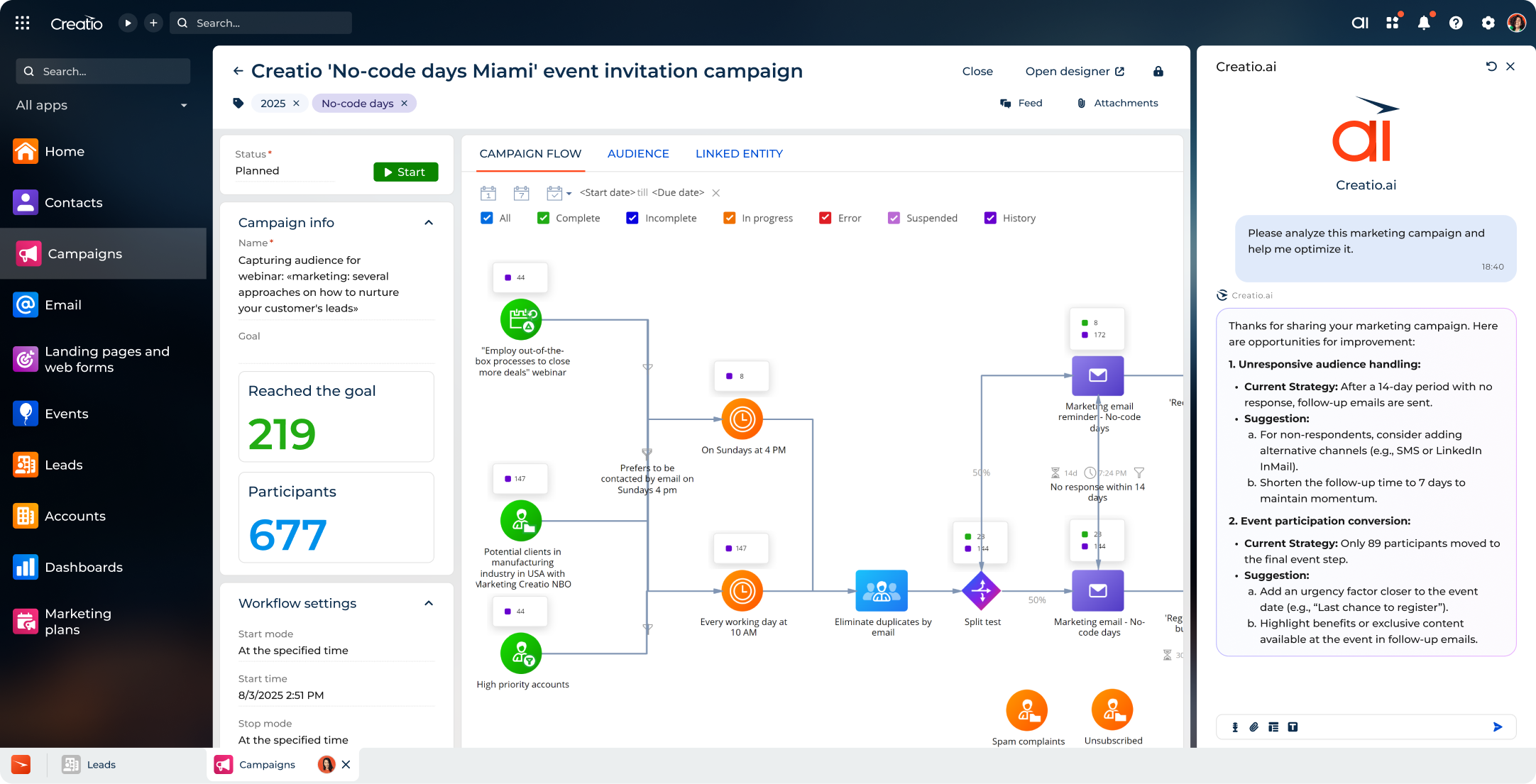
Building AI Marketing Campaigns with Creatio Marketing
#2. Content Generation
AI tools are extensively used in marketing for a wide range of content generation tasks — from planning complex campaigns to designing and writing copy for emails and landing pages. According to McKinsey, around 63% of organizations use generative AI to create text outputs, while 36% use it for image generation and 13% for video production.
Generative AI systems can produce high-quality marketing assets tailored to specific audiences and campaign goals, ensuring messages resonate at every stage of the customer journey. Enhanced creativity, productivity and content automation capabilities make AI an essential part of any marketer's toolkit.
Common use cases of AI in content marketing:
- Generate new ideas for marketing campaigns, topics, or creative concepts.
- Create personalized content for emails, ads, websites, and social media posts.
- Optimize existing content by improving tone, structure, or keyword relevance.
- Tailor messaging and formats for specific channels and audience segments.
- Translate and localize content to adapt to different regions and languages.
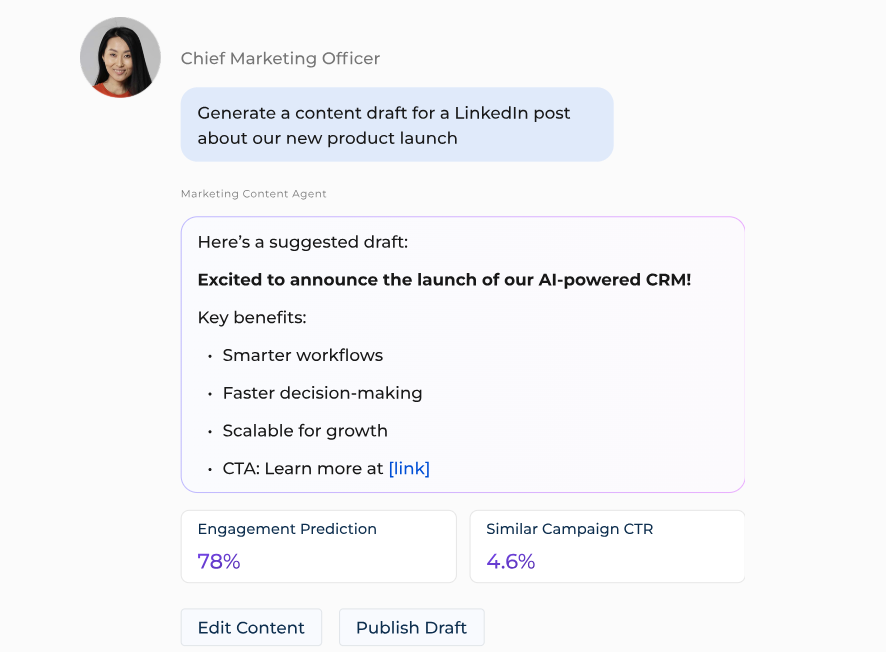
Generating Content Drafts with Creatio’s Marketing AI Agents
#3. Marketing Data Analysis & Forecasting
Marketing teams use AI for analyzing large, multi-source datasets and revealing patterns in customer behavior and campaign performance that help them make informed decisions.
AI can reveal what truly drives conversions, forecast trends and shifts, and allocate resources where they’ll have the greatest impact—both before launch and in flight.
This allows businesses not only see what tactics work best and adapt their marketing strategies, but also get a notable competitive advantage that fuels growth.
Common applications of AI in marketing data analytics:
- Unify data from CRM, analytics, ad platforms, and sales systems to create a single performance view.
- Detect patterns and drivers of conversion or churn to guide audience, creative, and offer decisions.
- Forecast demand, traffic, and revenue by product, region, or channel to set realistic targets.
- Predict campaign outcomes and recommend pre-launch and in-flight optimization shifts for maximum ROI.
- Monitor KPIs in real time, flag anomalies, and suggest next steps to optimize performance.
#4. Audience Segmentation & Targeting
AI marketing tools are highly effective at segmenting audiences into precise groups based on behavior, demographics, preferences, and engagement patterns.
By analyzing diverse audience data, AI algorithms can identify shared characteristics among customers and prospects, uncovering new lookalike audiences that are likely to be interested in your products or services. They can also assist in building ideal customer profiles (ICPs) to build more relevant messaging and improve overall campaign efficiency.
Some cases of AI marketing tools in this case include:
- Automatically segment users based on behavioral, demographic, or firmographic data.
- Score and prioritize target audiences with the highest conversion potential.
- Identify lookalike audiences that resemble the ideal customer profile.
- Refine targeting for ads, emails, and offers using real-time engagement data.
- Continuously update audience profiles as new customer data becomes available.
#5. Customer Journey Personalization
AI enables marketers to understand and personalize every stage of the customer journey, delivering messages that align with each individual’s intent and preferences across multiple touchpoints.
By analyzing how customers engage with your brand across websites, emails, digital ads, and social media, AI marketing tools can build tailored content, refine messaging, and even suggest specific campaigns that resonate with each audience segment and drive results.
The best AI applications in customer journey personalization:
- Map customer journeys across all channels to identify key decision points and behaviors.
- Generate personalized product or content recommendations in real time.
- Adjust messaging and campaign timing based on user intent, preferences, or engagement history.
- Suggest next-best actions or offers to nurture leads and move them toward conversion.
#6. Media Buying and Advertising
AI is redefining media buying by automating ad placement, targeting, and bidding across digital channels. Through programmatic advertising platforms, AI can continuously analyze audience data, engagement patterns, and contextual signals to deliver more relevant ads and maximize their efficiency.
Additionally, AI excels in retargeting by continuously learning from each customer interaction or conversion. This enables the system to optimize future content and marketing strategies, ensuring higher engagement and conversion rates.
Common use cases of AI in digital advertising:
- Automate media placement and bidding through programmatic advertising platforms.
- Optimize ad targeting based on engagement, demographics, and contextual data.
- Analyzes creative performance and recommends adjustments to maximize reach and impact.
- Allocates ad budgets dynamically across channels to improve ROI.
#7. Email Marketing
AI-powered tools are transforming traditional email marketing automation into autonomous, data-driven communication systems. They analyze user behavior and preferences to create and optimize email content, adjust sending frequency, and determine the ideal delivery time — ensuring each message achieves maximum engagement and click-through rates.
Common use cases of AI in email marketing:
- Segment email lists based on user behavior, preferences, or engagement level.
- Draft personalized emails tailored to individual recipients.
- Identify best send times for each segment to maximize open and click rates.
- Conduct automated A/B testing to refine subject lines and creative elements.
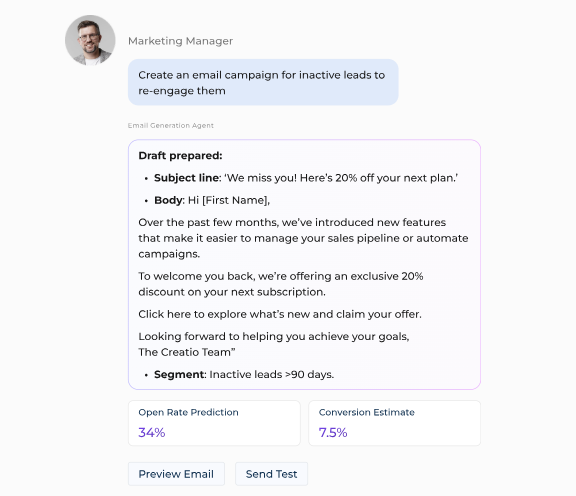
Creating Personalized Emails with Creatio’s Marketing AI Agents
#8. Competitive intelligence
AI enables marketers to monitor and analyze competitors’ digital strategies to uncover opportunities and stay ahead of market trends.
It can track competitors’ social media activity, ad performance, content engagement, and search visibility to identify patterns, successful tactics, and gaps in their approaches.
With these AI insights, marketing teams can benchmark performance, refine positioning, and adapt strategies more effectively.
Common use cases of AI in competitive intelligence:
- Track and analyze competitors’ campaigns, content, and advertising performance across channels.
- Identify emerging market trends and successful messaging strategies.
- Benchmark share of voice, engagement metrics, and audience sentiment.
- Highlight gaps in competitors’ targeting or content that can be converted into opportunities.
- Recommend data-driven adjustments to maintain a competitive advantage.
#9. Social Listening and Brand Reputation Management
By leveraging natural language processing (NLP) and sentiment analysis, AI tools evaluate how customers talk about your brand on social media, forums, review sites, and other online channels. For example, AI can send real-time alerts for negative sentiment or emerging issues, enabling teams to respond quickly and manage potential crises before they escalate.
AI marketing in social listening is used to:
- Monitor social media, forums, and news outlets to track brand mentions in real time.
- Analyze sentiment and emotion in customer conversations to assess public perception.
- Generate response strategies and messaging tactics based on sentiment trends.
#10. Marketing Automation
AI marketing tools are transforming how businesses automate and scale digital marketing operations. By connecting workflows, data, and decisions across multiple channels, AI helps create a truly intelligent marketing engine that executes campaigns seamlessly, enhances coordination, and ensures every interaction is both timely and relevant.
AI in marketing automation can also be used:
- As a digital marketing assistant to help marketers perform daily tasks and design personalized workflows.
- To automate complex workflows often through marketing AI agents that execute tasks with minimal human oversight.
- To identify next-best actions based on user behavior, campaign performance, and historical trends.
- For detecting process bottlenecks and recommending improvements that enhance efficiency and scalability.
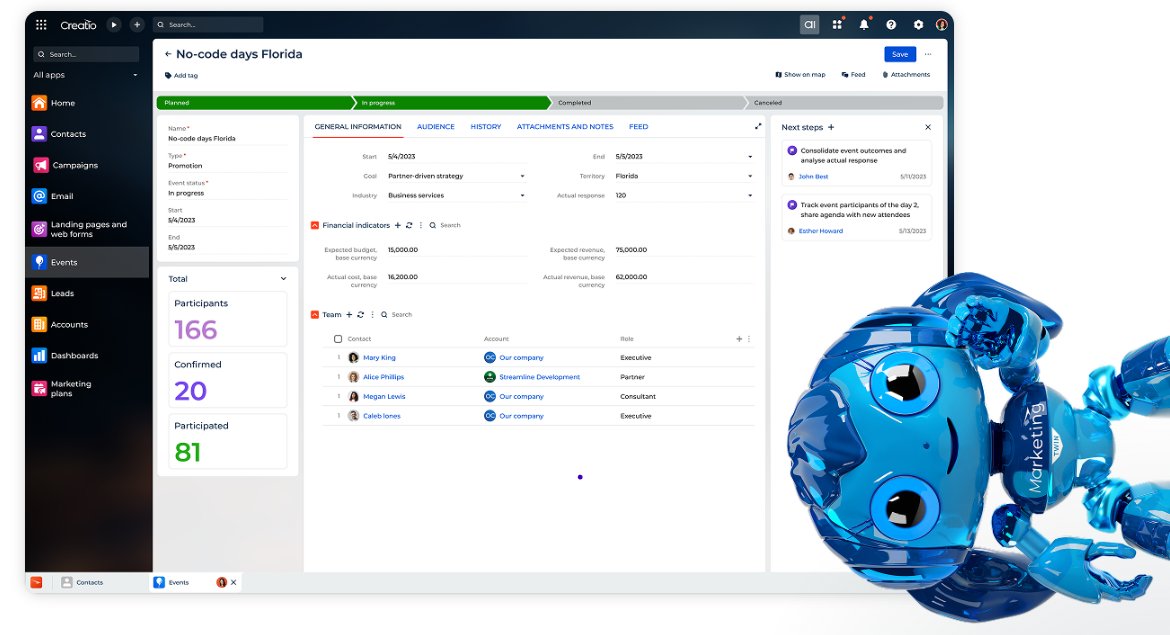
Managing Event Marketing Campaigns with Creatio Marketing
Best AI Marketing Tools & Systems to Consider in 2026 and Beyond
According to Gartner, by 2025 nearly 40% of enterprise applications will feature task-specific AI Agents designed to enhance productivity and automate decision-making.
In marketing, AI has already become the backbone of various operations, helping teams plan campaigns, generate content, analyze performance, and engage audiences with greater precision. Below are the main categories and examples of cutting-edge AI tools that are already transforming marketing workflows across industries.
- Agentic Marketing Platforms – used by midsize to enterprise go-to-market teams to design, run, and optimize highly personalized marketing campaigns and support any type of marketing strategy via end-to-end workflow automation, built-in AI tools and agents. (e.g., Creatio Marketing)
- Content Generation Tools – used by content and creative teams to generate ideas, text, and visuals tailored to specific campaigns, products, or audiences. (e.g., Jasper AI)
- Content Optimization Platforms – used by SEO and digital marketing teams to improve search visibility, structure, and engagement of existing content with AI-driven recommendations. (e.g., Surfer SEO)
- Visual Content Tools – used by design and brand teams to create or enhance campaigns with images, infographics, and other brand-aligned visuals with AI-assisted generation and editing. (e.g., Venngage)
- Email Marketing Software – used by marketing professionals to design end-to-end email campaigns, personalize email content, optimize send timing and audience segmentation with AI. (e.g., Creatio Marketing)
- Social Media Management Tools – used by social media professionals to plan, create, publish, and repurpose content across multiple platforms with AI-assisted scheduling, optimization, and analytics. (e.g., Buffer AI Assistant).
- Digital Ads Software – used by PPC and growth marketing teams to automate ad creation, targeting, and bidding, while optimizing budgets and creatives in real time with AI. (e.g., Smartly.io)
- Social Listening & Reputation Management Tools – used by PR, communications, and marketing teams to monitor brand mentions, analyze sentiment, and respond to audience feedback across digital channels with AI-driven insights. (e.g., Brand24)
- Project Management Tools – Project Management Tools – used by cross-functional marketing teams to coordinate projects and automate task tracking with AI assistance. (e.g., ClickUp AI)
While individual tools like Jasper AI or ClickUp AI are useful for handling specific marketing tasks, marketing departments aiming to build enterprise-scale workflows across multiple channels, agentic AI platforms such as Creatio Marketing are a better fit. They enable teams to consolidate data, automate end-to-end workflows, and manage all marketing operations within a single, AI-powered ecosystem.
How to Leverage AI in Marketing: 5 Best Practices
To help your organization maximize the value of AI in marketing, here are five best practices that will support effective AI adoption and long-term success.
1. Start with Clear Goals
Define what success looks like before integrating AI into your marketing operations.
Whether your goal is to improve lead quality, boost campaign ROI, or enhance personalization, you should identify one or two areas where AI marketing implementation can deliver immediate value, for example, in email marketing, event campaign management, or customer analytics. This will help your team to maximize efficiency and leverage AI tools confidently across the key operations.
2. Unify Data and Tools to Maximize AI Impact
AI is only as good as the data behind it.
Before adopting AI marketing tools or feature-rich agentic platforms, ensure they can seamlessly integrate with your existing data systems. Unified, accessible data allows AI to generate accurate insights, recommendations, and predictions that truly support your strategy.
In some cases, AI adoption can even simplify your tech stack — helping businesses replace fragmented tools with a single platform that manages CRM, marketing automation, email campaigns, digital ads, and offline events in one place. This not only aligns marketing teams around shared data but also streamlines workflows and reduces software costs.
3. Choose the Right AI Platform for Marketing
Rather than choosing a tool based on trends, evaluate each option by how well it fits your organization’s strategy, data ecosystem, and scalability needs.
When comparing AI marketing vendors, consider the following criteria:
- Functionality: Make sure the platform supports essential capabilities such as customer 360, lead management, campaign management and automation, email marketing and digital ads, event management, and more.
- Customization: Choose systems that can adapt to your specific marketing processes and workflows. For example, no-code AI platforms can help adapt your marketing applications to your unique use cases without requiring coding skills.
- Integration: Ensure seamless connection with your existing business systems and infrastructure to maintain a unified data flow.
- Ease of Use: Look for intuitive interfaces that your marketing team can adopt quickly with minimal training.
- Scalability: The platform should grow with your business, supporting additional use cases, data sources, and AI integrations over time.
- Pricing: Assess the total cost of ownership — not just licensing — and make sure it aligns with your organization’s goals and expected ROI.
4. Customize AI Marketing Software to Your Business Needs
Once you’ve chosen the best AI system, the next step is to tailor it to your organization’s unique workflows and goals.
The most effective AI platforms are not those that force teams to adapt, but those that seamlessly adjust to your processes, empowering marketers to work smarter and faster.
Modern AI marketing platforms allow you to customize AI skills, prompts, and role-specific agents to perform a wide range of tasks, such as:
- Enriching lead information and providing deeper customer insights.
- Suggesting optimal campaign strategies based on historical performance data.
- Generating personalized email or ad content that matches audience preferences.
- Creating detailed reports and dashboards for campaign analysis and ROI tracking.
Customizing software to your goals and workflows can not only improve marketing processes but also become a powerful solution that continuously improves your marketing performance and adapts to your evolving business needs.
5. Empower and Train Your Team
The most effective AI integration strategies always combine technology use with human creativity. Investing in team training ensures your marketers can use AI tools effectively, interpret insights correctly, and integrate AI technology to maximize your marketing results. For example, your team can learn
Beyond improving productivity, training also empowers your team to identify new AI use cases and opportunities for automation — fostering wider adoption and deeper integration of AI across your marketing organization.
Main Challenges in AI Marketing Implementation
While AI offers significant advantages for marketing teams, its adoption also introduces several challenges that organizations must address to ensure ethical and effective use.
Challenge 1: Data Quality and Accuracy
AI’s effectiveness depends on the data it learns from. Incomplete, inconsistent, or biased datasets can lead to inaccurate insights or ineffective campaigns. Regular data audits and human oversight are critical to maintaining accuracy and brand consistency.
Challenge 2: Data Privacy and Compliance
Because AI systems rely heavily on customer data, adhering to privacy regulations such as GDPR or CCPA is essential. Marketers must ensure transparent data collection, secure storage, and responsible usage to protect consumer trust and avoid legal risks.
Challenge 3: Algorithmic Bias
AI models can unintentionally amplify existing biases in data, resulting in unfair audience targeting or misrepresentation. Establishing ethical guidelines and regularly testing AI systems for bias is key to ensuring fair and inclusive marketing practices.
Challenge 4: Lack of Transparency (the “Black Box” Problem)
Many AI algorithms operate with limited interpretability, making it difficult for teams to understand how specific decisions are made. This lack of transparency can create accountability issues, especially when AI influences customer segmentation or ad placement.
Challenge 5: Workforce Transformation
As AI automates more marketing tasks, many teams face skill gaps or concerns about job displacement. The key is not replacement, but transformation. Organizations should prioritize upskilling and reskilling employees to work effectively alongside AI, allowing them to focus on strategic, creative, and high-impact work.
According to Creatio’s 2025 Global Survey Report, over 84% of business leaders believe AI agents will reimagine how people work rather than reduce headcount, which again highlights that AI is seen as augmenting, not replacing, humans.
Enhance your Marketing Campaigns with Creatio Marketing
Successful marketing isn’t about mastering a single channel — it’s about creating a cohesive, cross-channel strategy that delivers consistent messaging and reaches the right audience at the right time. Today, AI makes this possible by unifying data, automating workflows, and helping marketers deliver personalized experiences across every touchpoint.
Creatio is an agentic platform that empowers businesses to automate CRM and workflows with AI and no-code at its core. By embedding generative, predictive, and agentic AI directly into the platform, Creatio enables users to design, launch, and optimize processes of any type and complexity at greater speed — all while maintaining full human-in-the-loop control.
One of its agentic CRM products, Creatio Marketing, is a new era of marketing automation designed to accelerate the lead-to-revenue cycle with advanced no-code and AI capabilities. The platform streamlines both customer-facing and back-office marketing operations, helping teams execute campaigns faster and with greater precision.
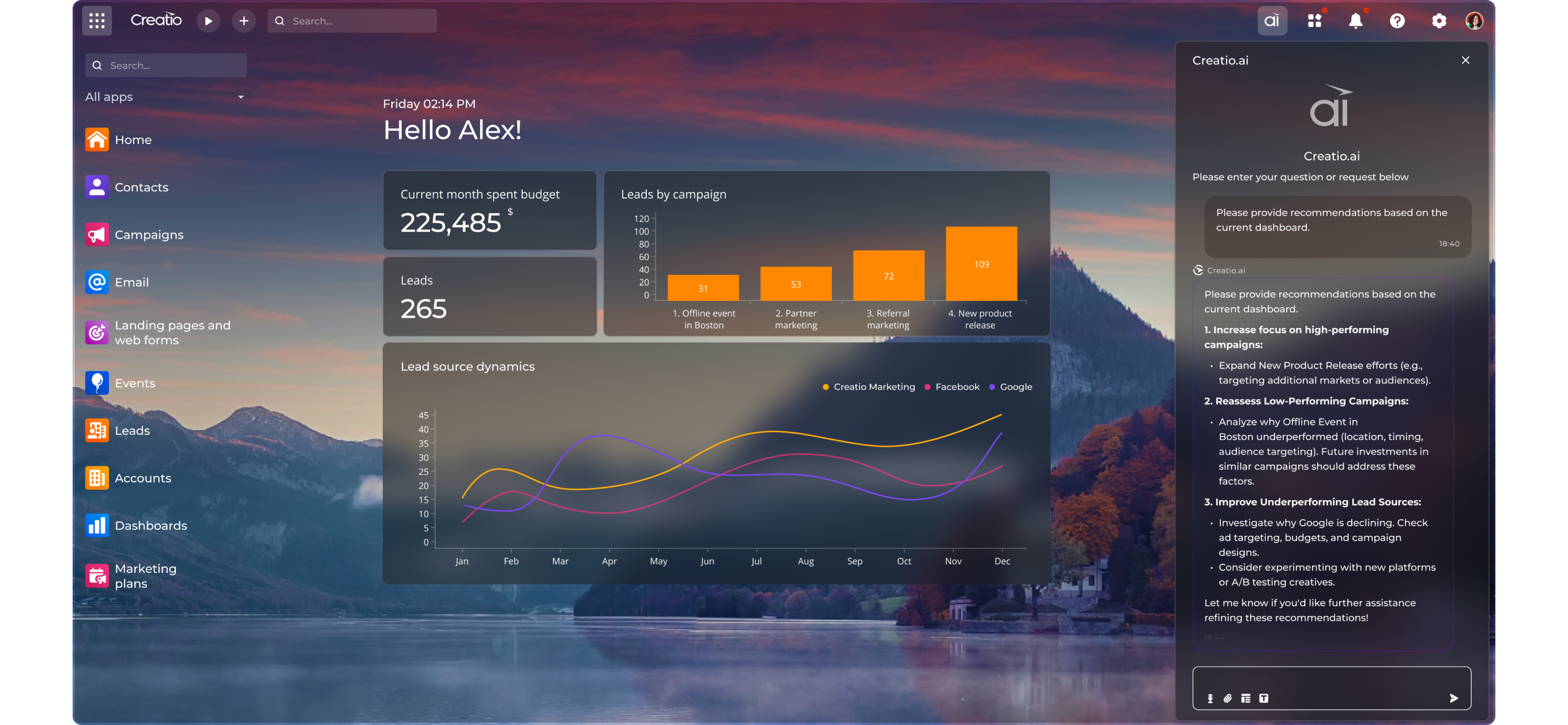
Creatio’s Agentic Marketing Platform
Creatio Marketing offers a suite of out-of-the-box (OOTB) AI-powered applications, all enhanced with AI agents. Business users can easily modify these applications or create entirely new ones without relying on IT, thanks to Creatio’s composable architecture and no-code tools.
Key marketing applications include:
- Customer 360 – A complete, 360-degree view of contact and account data, including omnichannel engagement history across the customer journey.
- Lead Management – AI-powered tools for managing the entire lead lifecycle, from capture and qualification to engagement, conversion, and recycling.
- Digital Ads – Full-cycle ad management with built-in optimization, analytics, and performance tracking.
- Email Marketing – End-to-end automation of email campaigns, complete with visual design tools, A/B testing, and performance reporting.
- Event Management – Centralized planning and execution for online and offline events, including budgeting, segmentation, task management, and analytics.
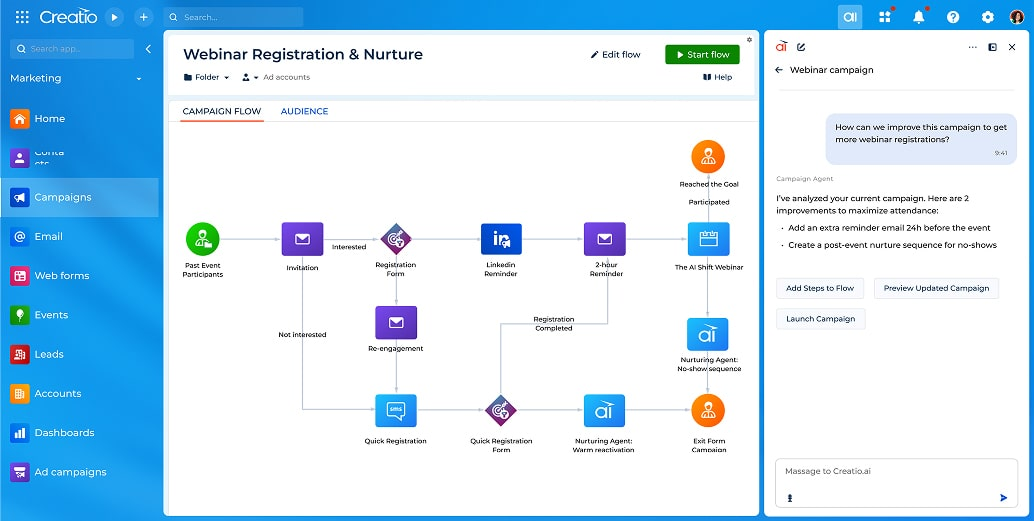
Building AI-Enhanced Campaigns with Creatio’s Agentic Marketing Platform
Creatio Marketing also provides a range of ready-to-use AI agents that enhance marketing efficiency by handling routine, data-intensive tasks. Each agent has specific AI skills and can be further customized to fit your workflows.
- Marketing Content Agent
- Email Generation Agent
- Campaign Agent
- Lead Scoring Agent
- Lead Distribution Agent
Moreover, with the no-code Agent Builder, marketing teams can design custom AI agents, define their roles and skills, and tailor them to unique business goals — all without technical expertise.
Creatio Marketing is part of the unified Creatio CRM suite, which also includes Creatio Sales and Creatio Service, enabling seamless end-to-end automation across the entire customer lifecycle. Whether deployed as a standalone solution or as part of an all-in-one CRM platform, Creatio ensures flexibility, scalability, and effortless integration with over 700 third-party applications.
Creatio is an ideal choice for medium to large organizations seeking an adaptable, efficient, cost-effective marketing software with embedded AI capabilities. The company is recognized as a Leader in the Gartner® 2025 Magic Quadrant™ for B2B Marketing Automation Platforms Report for the fifth consecutive year, which again underlines its quality and performance.
Summary
AI is transforming the way marketers plan, execute, and optimize their campaigns and workflows. It enables businesses to automate routine tasks, personalize customer experiences, generate content, refine audience targeting, and make data-driven decisions that enhance performance across every channel.
AI platforms like Creatio Marketing unify key marketing applications within a single agentic ecosystem, helping teams streamline workflows, improve collaboration, and scale marketing efforts efficiently. By integrating AI into core marketing operations, companies can drive smarter strategies, achieve sustainable growth, and strengthen their competitive edge.




















































